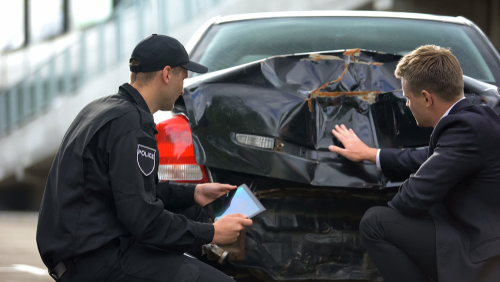When Houston’s 67,644 Crashes Collide with Your Rideshare Journey
With 67,644 total crashes reported in Houston during 2023, stepping into an Uber or Lyft might feel like rolling the dice with your safety. If you’ve been injured as a rideshare passenger in one of these accidents, you’re probably dealing with mounting medical bills, missed work, and a confusing web of insurance companies all pointing fingers at each other. The good news? Passengers injured in car accidents typically have a strong basis for a claim since they’re rarely considered liable for crashes, giving them a solid foundation for seeking compensation. Understanding how Texas rideshare laws work after an accident can mean the difference between getting fairly compensated and being left to handle everything on your own.
💡 Pro Tip: Screenshot your rideshare app immediately after any accident – this proves you were a passenger and shows the exact trip status, which determines which insurance policy covers you.
Feeling overwhelmed by the tangled web of insurance claims after a rideshare accident in Houston? Don’t let the stress of escalating bills and lost time keep you up at night. Reach out to Payne Law Firm today at 713-223-5100 or contact us online, and let us help you navigate through this labyrinth with confidence.

Why Rideshare Passengers Have Stronger Legal Standing Than You Think
Unlike drivers who might share fault in a collision, rideshare passengers enter accidents with a significant legal advantage – you weren’t operating either vehicle. This seemingly simple fact transforms your position when dealing with insurance companies. A rideshare accident attorney in Houston understands that rideshare services aren’t classified as common carriers like buses or trains, which means they operate under unique insurance requirements that vary based on Texas regulations. These companies maintain layered insurance structures where coverage can shift dramatically depending on whether your driver was logged into the app, waiting for a ride request, or actively transporting you.
The interplay between individual drivers, rideshare company policies, and third parties creates a complex liability puzzle that often works in passengers’ favor. When multiple insurance policies potentially apply to your accident, you gain leverage that solo drivers simply don’t have. Your rideshare accident attorney in Houston can identify which policies provide coverage and pursue claims against all responsible parties, maximizing your potential recovery for both economic damages like medical bills and non-economic damages such as pain and suffering.
💡 Pro Tip: Save all rideshare receipts and trip confirmations – these digital records prove your passenger status and help establish the timeline crucial for determining insurance coverage.
Your Roadmap Through the Texas Rideshare Claim Process
After a rideshare accident, timing becomes everything. Texas law sets specific deadlines and procedures that can make or break your claim. Working with a rideshare accident attorney in Houston helps ensure you meet every critical deadline while building the strongest possible case. The process typically unfolds in predictable stages, each with its own challenges and opportunities.
Immediate Response (0-48 hours): Document the accident scene, gather driver and witness information, seek medical attention even for minor injuries, and notify both the rideshare company and your own insurance
Insurance Investigation (1-4 weeks): Multiple insurers will investigate – the rideshare driver’s personal policy, the rideshare company’s commercial coverage, and potentially third-party driver insurance all come into play
Medical Documentation (Ongoing): Continue treatment and maintain detailed records – gaps in treatment can significantly reduce your claim value
Demand and Negotiation (2-6 months): Your attorney compiles evidence and presents demands to all applicable insurance companies, often discovering coverage you didn’t know existed
Settlement or Litigation (6-18 months): Most passenger injury claims settle without trial, but having an attorney ready for court strengthens your negotiating position
💡 Pro Tip: Texas generally gives you two years to file a lawsuit, but evidence disappears quickly – dashcam footage, surveillance video, and witness memories fade within weeks.
How a Rideshare Accident Attorney in Houston Maximizes Your Recovery
Navigating rideshare accident claims without legal guidance often leaves money on the table. Insurance adjusters know most passengers don’t understand the layered coverage structure or their rights under Texas law. Payne Law levels this playing field by thoroughly investigating which insurance policies apply to your specific situation. If your driver had the app on but wasn’t carrying a passenger yet, different coverage limits apply than if you were mid-trip. These distinctions can mean tens of thousands of dollars in available coverage.
Beyond identifying all available insurance, your rideshare accident attorney in Houston coordinates with medical providers to ensure your injuries are properly documented and future medical needs are accounted for in any settlement. This comprehensive approach addresses both immediate expenses and long-term impacts that insurance companies hope you’ll overlook. By understanding how Texas courts have ruled on similar rideshare cases, experienced attorneys anticipate insurance company tactics and counter them effectively.
💡 Pro Tip: Never accept the first settlement offer – insurance companies routinely lowball rideshare passengers who don’t have attorneys, betting you won’t understand the true value of your claim.
The Hidden Insurance Layers Most Rideshare Passengers Never Discover
Commercial coverage provided by rideshare companies generally applies when a passenger is on board from pick-up to drop-off, but this represents just one layer of potential coverage. Your rideshare accident attorney in Houston can uncover additional insurance sources you might not realize exist. For instance, if another driver caused the crash, their liability coverage becomes primary, with rideshare insurance serving as additional protection. Your own uninsured motorist coverage might also apply, even though you weren’t driving.
When Driver Status Changes Everything
The moment your driver accepts your ride request, insurance coverage shifts dramatically. If the driver was offline when the accident occurred, claims might need to be filed with the driver’s personal auto insurance rather than the rideshare company’s commercial policy. This distinction catches many passengers off-guard, especially when personal policies exclude commercial driving activities. Understanding these coverage triggers helps explain why documenting your rideshare trip status becomes so critical – it literally determines which million-dollar policy protects you.
💡 Pro Tip: Check if your own auto insurance includes rideshare passenger coverage – some policies now offer this protection as an add-on that follows you into any rideshare vehicle.
Special Considerations for Houston’s No-Fault Insurance Rules
While Texas follows traditional at-fault insurance rules, passengers coming from no-fault states often misunderstand their rights here. In Texas, establishing fault remains crucial for recovery, but passengers rarely face this burden since they weren’t controlling either vehicle. Understanding passenger injuries in car accidents within Texas’s legal framework reveals opportunities that no-fault states might restrict. You can pursue claims for pain and suffering without meeting severity thresholds that other states impose.
Why Texas Passengers Recover More
Texas law allows rideshare passengers to seek full compensation for non-economic damages without artificial caps or thresholds. Unlike no-fault states where passengers must prove permanent injury or exceed specific medical expense amounts, Texas passengers can recover for any injury caused by another’s negligence. This legal environment, combined with rideshare companies’ substantial insurance policies, creates favorable conditions for passenger recovery. Your attorney can pursue compensation for emotional distress, loss of enjoyment of life, and other intangible losses that no-fault states might limit.
💡 Pro Tip: Keep a daily journal documenting pain levels, missed activities, and emotional impacts – Texas courts consider these non-economic damages seriously in passenger injury cases.
Protecting Your Rights When Multiple Insurance Companies Get Involved
Rideshare accidents often trigger a frustrating game of hot potato between insurance companies, each trying to shift responsibility elsewhere. Understanding public transportation accident law principles helps, even though rideshares aren’t technically public transportation. The same concepts of passenger protection and carrier responsibility apply, just through different legal mechanisms. When three or four insurance companies get involved, they’ll each conduct separate investigations, request duplicate documentation, and potentially offer conflicting settlement amounts.
Coordinating Claims Without Getting Overwhelmed
Managing multiple insurance claims simultaneously requires strategic coordination. Each insurer will assign different adjusters, set different deadlines, and request different forms. Missing one company’s deadline could forfeit coverage under that policy, even while other claims remain active. This complexity explains why many passengers accept lowball offers just to end the frustration. However, patience and proper legal guidance often yield settlements several times higher than initial offers, especially when insurers realize they can’t simply wait out an overwhelmed passenger.
💡 Pro Tip: Create separate folders for each insurance company involved and log every conversation – this organization prevents costly miscommunications when dealing with multiple claims adjusters.
Frequently Asked Questions
Understanding Your Rights as a Rideshare Passenger
Houston’s high accident rate raises valid concerns about rideshare safety and passenger rights. These questions address the most common worries passengers face after accidents.
💡 Pro Tip: Write down questions as they occur to you – even seemingly simple questions often reveal important legal issues your attorney should address.
Navigating the Insurance and Legal Process
The intersection of rideshare technology and traditional insurance law creates unique challenges. Understanding these complexities helps you make informed decisions about your claim.
💡 Pro Tip: Don’t let insurance complexity discourage you – experienced attorneys handle these multi-party claims regularly and can simplify the process significantly.
1. If I was injured as a passenger in a rideshare accident, which insurance company do I contact first?
Start by reporting the accident through the rideshare app, which triggers their insurance process. However, don’t stop there – also notify your own auto insurance company and gather information from all drivers involved. The primary coverage depends on your driver’s app status and who caused the crash, which is why documenting everything immediately matters so much.
2. Can I still get compensation if my rideshare driver was at fault for the accident?
Yes, absolutely. As a passenger, you can seek compensation regardless of which driver caused the crash. If your rideshare driver was at fault, their personal insurance and the rideshare company’s commercial policy both potentially cover your damages. This is one of the strongest positions for injured passengers – you have valid claims regardless of fault determination between drivers.
3. How long do rideshare companies typically take to settle passenger injury claims in Texas?
Settlement timelines vary widely based on injury severity and liability clarity. Simple cases with minor injuries might settle within 2-3 months, while serious injuries requiring ongoing treatment often take 6-18 months. Rideshare companies generally move faster than traditional insurers due to public relations concerns, but they still protect their bottom line aggressively.
4. What if I didn’t feel hurt immediately after the rideshare accident but developed pain later?
Delayed injury onset is extremely common in vehicle accidents due to adrenaline masking pain. Texas law recognizes this reality and doesn’t penalize passengers for delayed symptoms. The key is seeking medical attention as soon as symptoms appear and connecting that treatment to the accident. Document when symptoms started and how they’ve progressed.
5. Are Houston Uber accident lawyer fees different from regular car accident attorney fees?
Most rideshare accident attorneys work on contingency fees, typically charging 33-40% of any settlement or verdict. This percentage doesn’t usually differ from standard car accident cases. However, rideshare cases often involve multiple insurance policies, potentially increasing total recovery amounts. The complexity might require more attorney time, but this doesn’t change your fee percentage.
Work with a Trusted Rideshare Accidents Lawyer
Rideshare accident claims demand specific knowledge of how these companies structure their insurance and fight claims. With Houston’s alarming crash statistics, having an attorney who understands both local traffic patterns and rideshare company tactics becomes essential. The right legal representation transforms an overwhelming insurance maze into a clear path toward fair compensation. Look for attorneys who stay current with rideshare law changes and maintain relationships with medical providers who understand accident injury documentation.
If navigating the aftermath of a rideshare accident has you tied up in knots, let Payne Law Firm guide you through with clarity and peace of mind. Dial 713-223-5100 or contact us today to unravel the complexities and secure the compensation you deserve.


